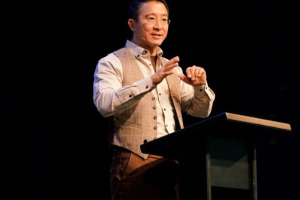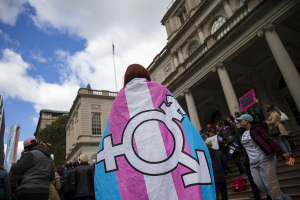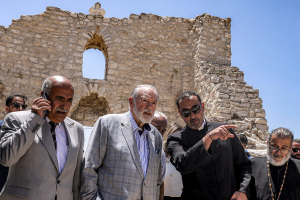Trump’s 1776 Commission releases report denouncing ‘problems of progressive education,' 1619 Project

The Trump administration’s 1776 Commission has released a report denouncing “the problems of progressive education” and recent endeavors like the 1619 Project, which has been denounced by some historians.
Titled “The 1776 Report” and released on Monday, the report derided far-left intellectual influences on American education, starting in the 1960s and into the present day.
“This new education replaced humane and liberal education in many places, and alienated Americans from their own nature, their own identities, and their own place and time,” read the report, in part.
“It cuts students off from understanding that which came before them. Like square pegs and round holes, students are made to fit the latest expert theory about where history is headed next.”
Specifically, it denounced ideas from the 1960s about objective truth not existing and The New York Times' 1619 Project, in which its lead author Nikole Hannah-Jones argues that "one of the primary reasons the colonists decided to declare their independence from Britain was because they wanted to protect the institution of slavery." She adds that: “Anti-black racism runs in the very DNA of this country.”
“By turning to bitterness and judgment, distorted histories of those like Howard Zinn or the journalists behind the ‘1619 Project’ have prevented their students from learning to think inductively with a rich repository of cultural, historical, and literary referents,” The 1776 Report adds.
“Such works … disdain today’s students, just as they doubt the humanity, goodness, or benevolence in America’s greatest historical figures. They see only weaknesses and failures, teaching students truth is an illusion, that hypocrisy is everywhere, and that power is all that matters.”
The report called for an “authentic education” based on principles including teaching Americans that they are all equal, encouraging the cultivation of “the love of country,” and relying “almost exclusively on primary sources.”
“While this country has its imperfections, just like any other country, in the annals of history the United States has achieved the greatest degree of personal freedom, security, and prosperity for the greatest proportion of its own people and for others around the world,” the report added.
“An authentic civics education will help rebuild our common bonds, our mutual friendship, and our civic devotion. But we cannot love what we do not know. This is why civics education, education relating to the citizen, must begin with knowledge, which is, as George Washington reminds us, ‘the surest basis of public happiness.’”
The report has criticized by some, including American Historical Association Executive Director James Grossman, as being a political polemic rather than an educational work.
“It’s a hack job. It’s not a work of history,” Grossman told The Washington Post. “It’s a work of contentious politics designed to stoke culture wars.”
Last November, Trump issued an executive order calling for the creation of a 1776 Commission in response to what the president referred to as “a series of polemics grounded in poor scholarship has vilified our Founders and our founding.”
“Despite the virtues and accomplishments of this nation, many students are now taught in school to hate their own country, and to believe that the men and women who built it were not heroes, but rather villains,” stated the order from last year.
“This radicalized view of American history lacks perspective, obscures virtues, twists motives, ignores or distorts facts, and magnifies flaws, resulting in the truth being concealed and history disfigured.”

The order warned that a failure to “identify, challenge, and correct this distorted perspective could fray and ultimately erase the bonds that knit our country and culture together.”
Trump’s executive order came after the release of the 1619 Project, published on the 400th anniversary of when slaves were introduced to colonial Virginia.
The project features a series of essays by scholars on slavery and arguments on how racism continues to influence the nation, from traffic patterns to diet.
“It aims to reframe the country’s history by placing the consequences of slavery and the contributions of black Americans at the very center of our national narrative,” stated the Times.
After the project was published, Princeton historian Sean Wilentz, Brown University’s Gordon Wood, Princeton’s James McPherson, and City University of New York’s James Oakes signed a letter to the Times listing factual errors in the Project that should be omitted from any future materials, like those being used in schools.
"No effort to educate the public in order to advance social justice can afford to dispense with a respect for basic facts," wrote Wilentz in a piece for The Atlantic published last year.
"In the long and continuing battle against oppression of every kind, an insistence on plain and accurate facts has been a powerful tool against propaganda that is widely accepted as truth. That tool is far too important to cede now."
Peter Kirsanow, a member of the U.S. Commission on Civil Rights, denounced the 1619 Project in comments made last September as “sheer propaganda” and “a corruption of history.”
Despite expressed concerns by some scholars, several school districts have adopted materials from the 1619 Project to be part of their social studies curricula.
School districts in Chicago, Illinois, Washington, D.C., and Buffalo, New York, began implementing the project in their K-12 course materials in early 2020.
In Buffalo, where the materials are a mandated part of the history curriculum for seventh through 12th grade, students are taught about "lesser-known consequences of slavery ... Its essays deal with things like how plantation economics led to modern corporate, capitalist culture ..." NPR previously reported.





























